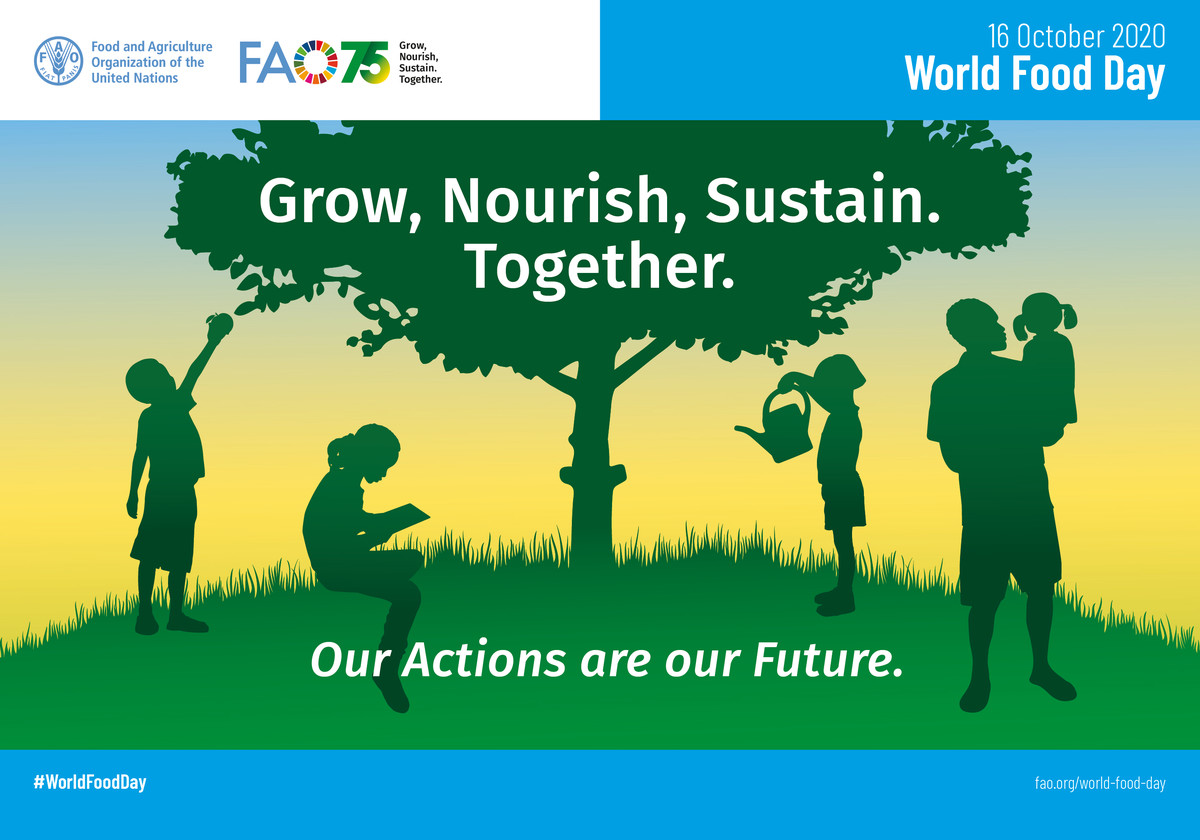 @FAO
@FAO
World Food Day -- 16 October 2020
Collective action across 150 countries is what makes World Food Day one of the most celebrated days of the UN calendar. Hundreds of events and outreach activities bring together governments, businesses, NGOs, the media, and general public. They promote worldwide awareness and action for those who suffer from hunger and for the need to ensure healthy diets for all.
World Food Day 2020 marks the 75th anniversary of FAO in an exceptional moment as countries around the world deal with the widespread effects of the global COVID-19 pandemic. It’s a time to look into the future we need to build together.
Food systems occupy nearly 40% of the ice-free surface of the Earth and thus represent important levers in the fight to protect biodiversity. Recognizing the role of biodiversity in underpinning the productivity and resilience of agricultural and other ecosystems is a critical first step towards transforming the way we produce food while guaranteeing food security. The recently released fifth edition of the Global Biodiversity Outlook outlines two important pathways to address these issues and move from business as usual towards transformative change.
While agriculture contributes significantly to conservation and sustainable use of biodiversity, it is also a major driver of biodiversity loss. The Earth’s biodiversity is being lost at an alarming rate, putting in jeopardy the sustainability of agriculture and ecosystem services and their ability to adapt to changing conditions, threatening food and livelihoods security.
The major challenge for agriculture is to ensure food security, adequate nutrition and stable livelihoods for all, now and in the future, by increasing food production while adopting sustainable and efficient agriculture, sustainable consumption of resources, and landscape-level planning to ensure the preservation of biodiversity.

World Food Day is calling for global solidarity to help all populations, and especially the most vulnerable, to recover from the crisis, and to make food systems more resilient and robust so they can withstand increasing volatility and climate shocks, deliver affordable and sustainable healthy diets for all, and decent livelihoods for food system workers. This will require better social protection, innovation and digitalization, and sustainable agricultural practices that preserve the Earth’s natural resources, our health, and the climate. But we all have a role to play, from increasing the overall demand for nutritious food by choosing healthy, to not letting sustainable habits fall by the wayside, and joining the global solidarity effort, despite these uncertain times.
More information:
Did You Know?
Intensified food production, combined with climate change, is causing a rapid loss of biodiversity. Today only nine plant species account for 66% of total crop production despite the fact that there are at least 30 000 edible plants.
2 billion people experience moderate or severe food insecurity, meaning they have difficulty in regularly accessing nutritious and sufficient food.
More than 113 million people across 53 countries experience acute hunger requiring urgent food, nutrition and livelihoods assistance.
The global population is expected to reach almost 10 billion by 2050, which will significantly increase the demand for food.
Approximately 14 percent of food produced for human consumption is lost each year before reaching the wholesale market.
Over 3 billion people in the world lack access to internet and most of them live in rural and remote areas. Smallholder farmers need greater access to finance, training, innovation and technology to improve their livelihoods.
A combination of poor diets and sedentary lifestyles has led to soaring obesity rates, not only in developed countries, but also low-income countries, where hunger and obesity often coexist. No region is exempt.
If our food systems are not transformed, undernourishment and malnutrition will greatly increase by 2050. This could increase more if there is further deterioration in income inequality, employment or basic access to services.
The impact of malnutrition in all its forms - undernutrition, micronutrient deficiencies, as well as overweight and obesity - on the global economy is estimated at USD 3.5 trillion per year.